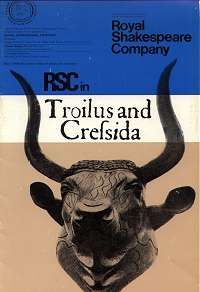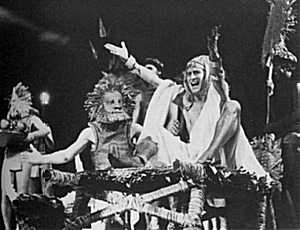
 |
Heroes, heels and hypocritesThe last thing to which theatre-goers, professional or otherwise, will admit is being shocked. Bored or angered, yes; but shocked, no...... To admit to being shocked suggests that one is naive, inexperienced, unused to the free air of the metropolis, provincial. This is particularly annoying when, like me, one actually is provincial. It costs me quite an effort therefore to say right out that when I saw John Barton's production of Troilus and Cressida last year at Stratford, it shocked me; and that, worse still, when I saw it on Monday at the Aldwych it shocked me again. When I think of all the fuss that was made over that harmless little piece The Beard, at the Royal Court I am surprised that such things as Thersites's gesture to the rear of the "masculine whore" Patroclus, or Achilles's shameful exhibition of himself to a ravished Hector, or Achilles's behaviour as Helen do not provoke an outraged Deity into drowning us in a new flood. |
 |
Even last year, however, I had to reluctantly admit that the production could be substantiated from Shakespeare's text. The horror of Shakespeare's mind when he wrote Troilus and Cressida is almost beyond the conception of ordinary mortals. In this play Shakespeare represents sex as all pervasive, as a matter for filthy sniggering, as the destroyer of honour, purity, and faithfulness, as manifesting itself in unutterable obscenities and flaunting perversions, and as the blood brother of war, which he sees as another and perhaps quicker way to orgasm.
This terrible and haunting condition of one of the greatest minds in the theatre is shown to us by Mr. Barton with an absolute mastery. Some of the scenes in which he presents it are extraordinary achievements in imaginative lechery and torment. One of them is that in which Hector, nearly naked, and Achilles, with braided hair and painted face and in a woman's robe, choose with lascivious delight the places in each other's body in which they will plant their swords. This is a scene of the most brilliant decadence, with an air of tragic sadness and terror hanging over its concupiscent double meanings. And there are several others just as powerful.
Today, I must say that though the shock remains the reluctance to admit it to be justified is gone. The first reason for this is Alan Howard's performance as Achilles. It seems to me to be of a higher order of excellence than it was at Stratford; or now perhaps my eyes are opened. Mr. Howard accepts all the difficult aspects of Achilles's character, his delight in presenting himself as a whore, even his treachery, and by seeing right through to the man's ambiguous and troubled heart creates for him a profound sympathy. His pained, thrilled cry, "I have a woman's longing, An appetite that I am sick withal, To see great Hector," and his sudden lassitudes of satisfied lust reveal to us so greatly aching a misery that moral judgments are swallowed up in compassion.
In the scene in which Hector is murdered, Mr. Howard's Achilles is at least as grand as he is hateful. Tall, graceful, and terrifying, his body painted with black snakelike curves, he towers balefully like something magnificent and evil from primeval Africa. The effect is tremendous.
The second reason is the extreme beauty of Michael Williams's Troilus. At Stratford I scarcely noticed either Troilus or Cressida. Something has happened since then either to them or to me. Now they are quietly and impressively the exquisite counterpart to the play's excesses of agony and horror. Helen Mirren is excitingly seductive and treacherous as Cressida, and her momentary flashes of shame are very moving.
Mr. Williams's Troilus is the very embodiment of youth, eagerness, purity, and trust. His innocence of heart amidst all that glittering moral squalor is infinitely touching. When, utterly disregarding the lip-licking lubricities of David Waller's fine Pandarus, he looks with an absolute confidence in goodness and love straight into Cressida's eye, saying: "You have bereft me of all words, lady," one is lifted into a better world than this, a world where everything is honour, and faith, and gentleness. The Shakespeare who could, at that point in the play, write a line like that is the Shakespeare we should worship, the Shakespeare who at this kind of overwhelmingly simple drama of affection and devotion can sometimes, but not always, give a good run for his money even to Mr. Harold Pinter. He is better even than the Shakespeare who could write
I am as true as truth's simplicity,
And
simpler than the infancy of
truth;
though Mr. Williams speaks that very beautifully too.
Troilus and Cressida has often been said to be a rather poor play. But as directed by Mr. Barton, and played by the Royal Shakespeare Company, especially by Miss Mirren, Mr. Williams, and Mr. Howard, it must be one of the greatest, as well as one of the most upsetting, things in the history of the theatre.
Harold Hobson
The Sunday Times, 17.8.69.